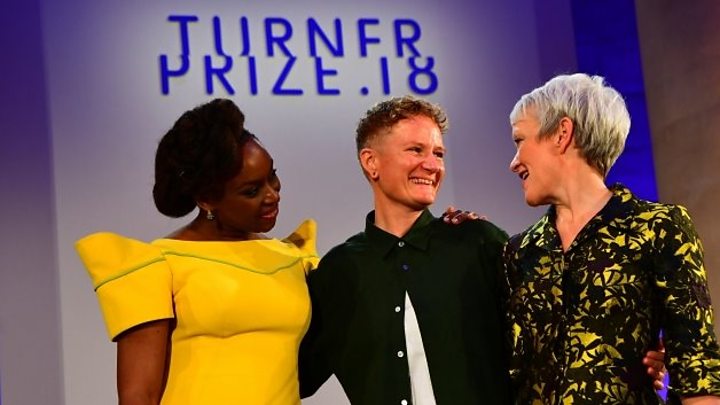An iPhone filmmaker’s film Bridgit has won the artworld’s prestigious 2018 Turner prize
iPhone filmmaker, Charlotte Prodger, has won the 2018 Turner prize. Featuring the Scottish countryside from a train window, a T-shirt on a radiator and a cat pawing at a lamp all contributed to Prodger collecting the £25,000 prize.
“unexpectedly expansive” Turner prize judges
The judges also “admired the painterly quality of Bridgit and the attention it paid to art history”.
The iPhone filmmaker was named by the novelist Chimamanda Ngozi Adichie at a ceremony in London on Tuesday evening. Known for exploring queer identity, the Glasgow-based artist won the annual art award for two of her videos.
The film Bridgit – which features her reading from her diaries – is highly personal and recalls her experiences of coming out as gay in rural Scotland.

On many contemporary art radars, Prodger has been making moving-image works for 20 years.
“I feel very honoured, blown away really. It’s quite surreal. It feels lovely.” Charlotte Prodger.
Prodger said she used an iPhone because the phone felt like an extension of her: “Because of that ease of use and the way you can use it while you are going about the world. For me, everything is in there.”
“The stories that I’m telling, although they’re mine and they’re personal, are stories that a lot of people – I guess queer people – have experienced,” she told BBC News.
The artist has had a good year, having also been chosen to represent Scotland at the 2019 Venice Biennale. But what would she do with the £25k? “I’ll live on it. I’ll pay my rent and my studio rent and some bills. Maybe there’ll be a little treat … probably a nice jacket. Don’t hold me to that!” she said.
“The most profound use of a device as prosaic as the iPhone camera that we’ve seen in art to date… seems to make a lot of points for a younger generation. It deals with gender as unfixed, as something fluid, as something not always conforming to society’s norms.” Alex Farquharson, Tate Britain director.
Prodger, 44, won for her Bergen Kunsthall exhibition in Norway, which featured two film works, Bridgit and Stoneymollan Trail. Bridgit is 32 minutes long and has been on display at Tate Britain as part of its Turner prize exhibition.
‘The power of art to convey ideas is unique… we must ensure that those ideas are diverse, freely expressed and accessible to all’ – Chimamanda Ngozi Adichie, award-winning writer & presenter of 2018 #TurnerPrize
Image: Chimamanda Ngozi Adichie, Charlotte Prodger, Maria Balshaw pic.twitter.com/Pz9PaUVWv8
— Tate (@Tate) December 4, 2018
“The film is difficult to explain. There is lots going on, a lot of it apparently randomly. It explores class, gender, sexuality and neolithic goddesses.” Mark Brown, Guardian
Shot rough and ready in fragments on an iPhone, the film captures many of the themes of contemporary life. It is a poetic meditation, exploring identity, gender, nationhood and how our subjective views can change.
“It would have been impossible to make when the Turner Prize was first awarded in 1984. But it’s now within the grasp of anybody with a smartphone and a story to tell.” BBC Entertainment & Arts
Prodger filmed the work over the course of a year, including footage of her at home and travelling. Her narration includes autobiographical content such as coming out in Aberdeenshire in the 90s and people being unable to tell whether she is a boy or girl.
Farquharson added that the work evoked traditions in landscape art and had psychological weight. “It ends up being so unexpectedly expansive. This is not what we expect from video clips shot on iPhones.”
“I think the jury was united in a feeling that this work was introducing something new to the filmic medium and how it is used in art,” Farquharson said.
For the first time in the prize’s history, all four artists were nominated for films
All four nominees made film work, all of it in some way political. The work has divided critics. The Observer’s Laura Cumming called it the best in years, “by turns shattering, absorbing, beguiling, highly political, frequently momentous”. However, Waldemar Januszczak in the Sunday Times wrote: “From beginning to end, this soul-crusher of a show is unusually awful.”
Re: the Turner Prize – I wish people would stop thinking there is still something avant-garde about film and video. Artists have been making film or video since the 1960s! It’s old hat! Traditional! Its problem is that it’s so easy to do that it attracts the untalented.
— WALDEMAR JANUSZCZAK (@JANUSZCZAK) December 5, 2018
But one visitor favourite has been Forensic Architecture, a collective that has been described as an “architectural detective agency” investigating state crimes and human rights abuses across the world.
In her acceptance speech, Prodger also spoke about support from arts education and funding.
“I wouldn’t be in this room were it not for the public funding that I received from Scotland for free higher education, and then later in the form of artist bursaries and grants to support not only the production of work but also living costs,” she said.
Eager to learn more?
Join our weekly newsletter featuring inspiring stories, no-budget filmmaking tips and comprehensive equipment reviews to help you turn your film projects into reality!
Simon Horrocks
Simon Horrocks is a screenwriter & filmmaker. His debut feature THIRD CONTACT was shot on a consumer camcorder and premiered at the BFI IMAX in 2013. His shot-on-smartphones sci-fi series SILENT EYE featured on Amazon Prime. He now runs a popular Patreon page which offers online courses for beginners, customised tips and more: www.patreon.com/SilentEye



[…] Prev […]